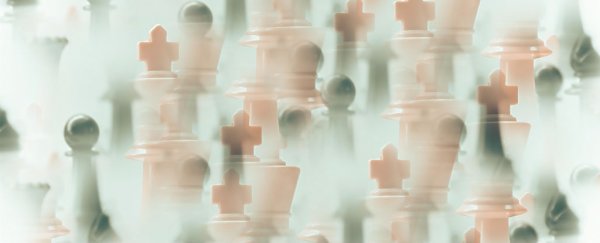Game theory is a branch of mathematics that looks at how groups solve complex problems. The Schrödinger equation is the foundational equation of quantum mechanics - the area of physics focused on the smallest particles in the Universe. There's no reason to expect one to have anything to do with the other.
But according to a team of French physicists, it's possible to translate a huge number of problems in game theory into the language of quantum mechanics. In a new paper, they show that electrons and fish follow the exact same mathematics.
Schrödinger is famous in popular culture for his weird cat, but he's famous to physicists for being the first to write down an equation that fully describes the weird things that happen when you try to do experiments on the fundamental constituents of matter. He realised that you can't describe electrons or atoms or any of the other smallest pieces of the Universe as billiard balls that will be exactly where you expect them to be exactly when you expect them to be there.
Instead, you have to assume that particles have positions that are spread out in space, and that they only have some probability of appearing where you think they're going to be at any point in time. If you work with spread-out probabilities instead of with specific positions, you can exactly predict the results of a bunch of experiments that puzzled physicists at the beginning of the 20th century.
Schrödinger's equation tells you the relationship between how these probabilities change in time and the way they change in space. Working with probabilities instead of positions might be weird, but it works. And physicists aren't going to argue with success.
Game theory doesn't seem to have anything to do with any of that. In general, it looks at how a bunch of agents make decisions to get closer to whatever goal they have in mind. That could mean people (hopefully) working together in traffic, or it could be people working against each other like they do in a board game.
In mean-field game theory, the branch that this study looks at, you're analysing what all of the different agents are doing on average - so it might readily apply to people in traffic, but it'd be a lot harder to apply to a single game of Monopoly.
The example physicists led by Igor Swiecicki from France's Laboratoire de Physique Théorique Orsay use is a school of fish that want to stay near each other while also looking independently for food.
The fish generally move as a single group, with a bunch of individuals moving around pretty randomly within it. Every once in a while, a fish might see a piece of food away from everyone else, and swim over on its own to grab it, before swimming back to its school for safety.
This means that the fish have some distribution; they're concentrated in the group and rarer as you get farther away from it. In other words, if you pick a particular spot in space, there's some probability that you chose somewhere with a fish and some probability you chose somewhere without a fish. As the school swims past your spot, the probability of finding a fish there goes up. After the school moves beyond that point, the probability goes down.
The probability of finding a fish could have evolved in any number of complicated ways with equations that had never before been written down. But it doesn't. The probability of finding a fish changes exactly like the probability of finding an electron does. The fish follow Schrödinger's equation, Swiecicki and his team report.
In the next few years, we might see game theory proceed in leaps and bounds as it takes advantage of this new connection. Physicists have been stretching and contorting Schrödinger's equation for almost a century, and they've gotten really good at using it to solve even the most complicated problems. But mean-field game theory has only been around for 10 years or so, meaning that there are plenty of wide-open questions peppering the landscape.
Now, a huge range of those open problems might be translatable into the framework of quantum mechanics. Given how much effort has gone into solving every conceivable quantum mechanics problem, there's a good chance those new problems will end up looking a lot like something physicists have seen before.
The paper has been published in Physical Review Letters.
